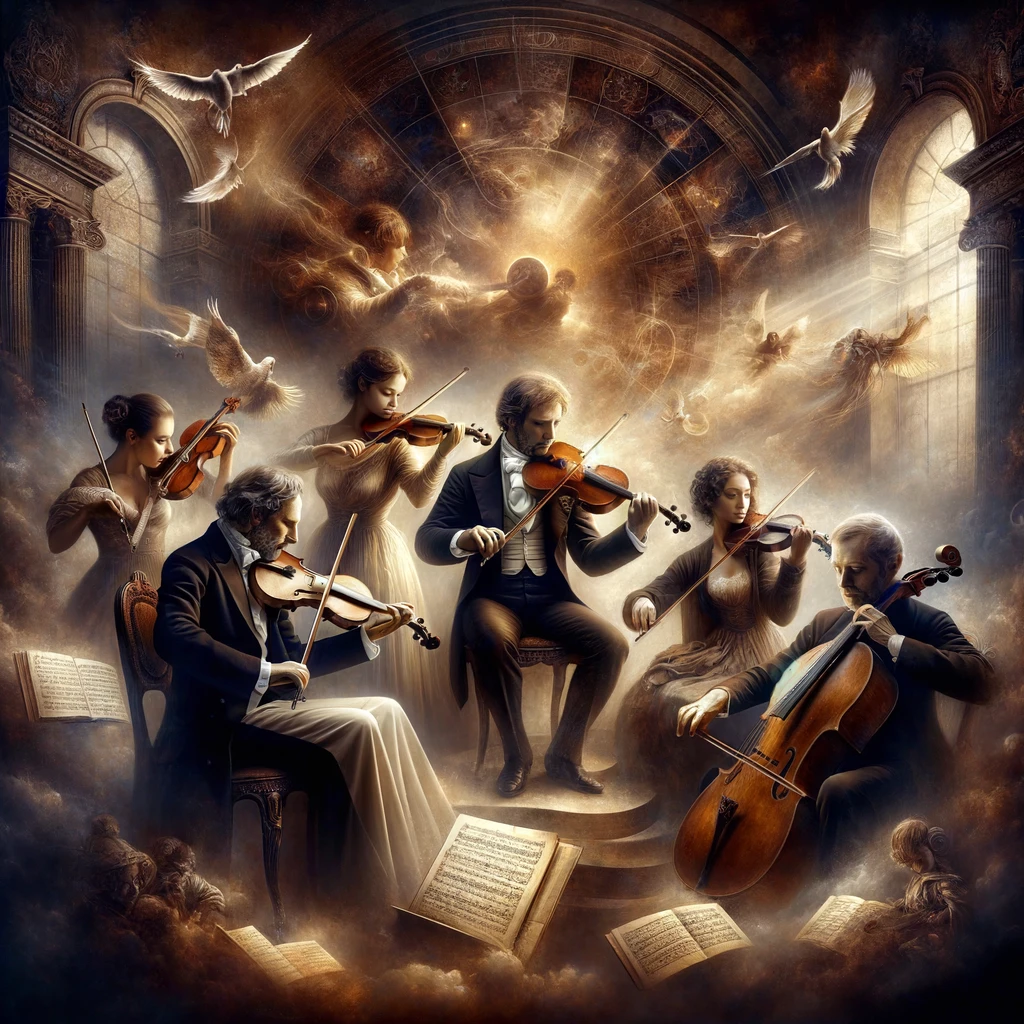
Beethoven’s Late Quartets: A Journey Through Genius and Struggle
Ludwig van Beethoven, a name synonymous with musical genius, composed some of his most profound works during the twilight years of his life – the Late Quartets. These quartets, steeped in emotional depth and innovative composition, were not just a culmination of his musical career but also a reflection of his personal struggles and resilience. In this article, we’ll dive into the world of Beethoven’s Late Quartets, exploring their significance and the extraordinary circumstances under which they were composed.
A Prelude to Genius
Before delving into the Late Quartets, it’s essential to understand the journey that led Beethoven to these works. Born in 1770 in Bonn, Germany, Beethoven was a musical prodigy. He moved to Vienna in his early twenties, quickly establishing himself as a virtuoso pianist and a gifted composer. However, his life was not without its hardships. The most significant of these was his encroaching deafness, which began in his late twenties. This loss was not just a physical ailment but an existential crisis for a musician whose life revolved around sound.
The Turn to Inner Worlds
As Beethoven grappled with his deafness, his music began to transform. He turned inward, exploring new depths of emotional and musical expression. This transformation is profoundly evident in his Late Quartets, written in the last decade of his life, between 1825 and 1826. These works – Op. 127, 130, 131, 132, 133, and 135 – are considered revolutionary, breaking the traditional norms of quartet composition.
Opus 127: E-Flat Major
The E-Flat Major Quartet, Op. 127, marked Beethoven’s return to string quartet composition after a decade-long hiatus. This piece is a blend of lyrical beauty and complex structures, setting the tone for the quartets that would follow. The opening Maestoso leads into a lyrical Allegro, showcasing Beethoven’s mastery in weaving intricate melodies.
Opus 130: B-Flat Major
The B-Flat Major Quartet, Op. 130, is unique for its unconventional six-movement structure. Each movement offers a different emotional landscape, from the playful opening to the deeply introspective Cavatina. The original final movement, the Grosse Fuge, was so avant-garde that it was often performed separately.
Opus 131: C-Sharp Minor
Perhaps the most daring of all is the C-Sharp Minor Quartet, Op. 131. It’s structured in seven movements played without a break, creating an uninterrupted musical journey. This quartet is a testament to Beethoven’s innovative spirit, breaking the traditional boundaries of quartet composition.
Opus 132: A Minor
The A Minor Quartet, Op. 132, is deeply personal, reflecting Beethoven’s struggles with illness. The central movement, titled “Holy song of thanksgiving of a convalescent to the Deity, in the Lydian mode,” is a reflection of his gratitude following a period of severe health problems. This quartet blends somber tones with a sense of triumphant recovery.
Opus 133: Grosse Fuge
Originally intended as the final movement of Op. 130, the Grosse Fuge, Op. 133, stands as a work of its own. This monumental fugue is a tour de force of contrapuntal technique, reflecting Beethoven’s mastery over complex musical structures.
Opus 135: F Major
The F Major Quartet, Op. 135, is Beethoven’s final complete work. It’s known for its lightheartedness, particularly in the final movement, which poses the musical question, “Must it be?” This quartet, while lighter in mood, still showcases the depth and maturity of Beethoven’s late style.
The Struggle Behind the Masterpieces
Creating these quartets was no easy feat for Beethoven. His deafness had become profound, rendering him completely isolated from the world of sound. He was also battling financial difficulties and deteriorating health. Yet, in the midst of these challenges, Beethoven poured his soul into his compositions, using them as a means to communicate what words could not.
The Significance of the Late Quartets
The Late Quartets are more than just pieces of music; they are a window into Beethoven’s soul. They encapsulate his struggle, his resilience, and his unyielding commitment to his art. These quartets broke new ground, pushing the boundaries of what was considered acceptable in classical music. They are characterized by their emotional depth, structural complexity, and a profound sense of introspection.
Legacy and Influence
Beethoven’s Late Quartets have had a lasting impact on the world of music. They have influenced generations of composers, inspiring them to explore new musical territories. These quartets have also captivated audiences for nearly two centuries, offering a deeply human experience that resonates with the struggles and triumphs of life itself.

The Artistic Journey of Beethoven’s Late Period
In understanding the significance of Beethoven’s Late Quartets, one must also appreciate the artistic journey that led to their creation. This period, often referred to as his “late” period, was marked by a shift towards a more introspective and complex musical language. It was during this time that Beethoven, now completely deaf, delved into uncharted musical territories, challenging existing norms and conventions.
The Emergence of a Deeper Musical Language
The Late Quartets are characterized by their profound emotional depth and complexity. Beethoven’s exploration of counterpoint, the interweaving of multiple independent musical lines, reached its zenith in these works. He experimented with structure, tonality, and rhythm, creating pieces that were ahead of their time. These quartets weren’t just music; they were conversations, debates, and confessions, all rolled into one.
The Personal as Universal
Beethoven’s personal struggles deeply influenced the emotional landscape of the Late Quartets. His deafness, loneliness, and ill health colored these works with a sense of struggle, but also with resilience and hope. It is this blend of personal experience and universal emotion that makes these quartets so relatable and powerful. They speak not just of Beethoven’s journey, but of the human condition, making them timeless in their appeal.
Reception and Legacy
Initially, the Late Quartets were met with bewilderment. Their complexity and unconventional nature were too advanced for contemporary audiences and even seasoned musicians. However, as time passed, the genius of these works was recognized. Today, they are revered as masterpieces, pushing the boundaries of what string quartets could express.
Influencing Future Generations
The impact of the Late Quartets on subsequent music cannot be overstated. They inspired composers like Schubert, Brahms, and Schoenberg to explore new musical possibilities. The quartets’ depth and complexity opened doors to emotional and structural exploration in music, paving the way for the Romantic and Modern eras.
The Late Quartets as a Source of Inspiration
Beyond their influence on music, Beethoven’s Late Quartets serve as a source of inspiration beyond the realm of classical music. They remind us of the power of human resilience and creativity. Beethoven’s ability to create such profound art in the face of personal adversity is a testament to the enduring spirit of humanity.
A Mirror to Our Own Struggles
Listeners find their own struggles and triumphs reflected in the music of the Late Quartets. In the sweeping melodies and complex harmonies, one can find echoes of joy, sorrow, turmoil, and peace. They are a musical journey through the landscape of human emotion, offering comfort and understanding to those who listen.
In Conclusion
Ludwig van Beethoven’s Late Quartets are much more than a collection of his final compositions. They are the culmination of a life devoted to musical exploration and expression. In these works, we find a reflection of Beethoven’s inner world, marked by struggle but also by immense resilience and creativity.
These quartets stand as a towering achievement in the history of music, challenging and inspiring both musicians and audiences alike. They remind us that even in the face of overwhelming challenges, the human spirit can create beauty and meaning. Beethoven’s Late Quartets are not just musical compositions; they are enduring symbols of the triumph of creativity over adversity.
As we listen to these masterpieces, we are invited into Beethoven’s world, experiencing the depth of his emotions and the brilliance of his mind. They are a gift of timeless music, speaking to us of the power of human expression and the unending quest for understanding and connection. Beethoven’s Late Quartets, in their complexity and beauty, continue to resonate with us, offering a source of inspiration and a reminder of the enduring power of human creativity.